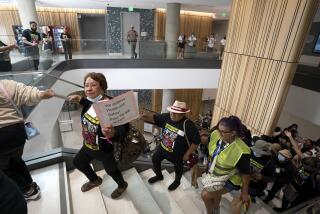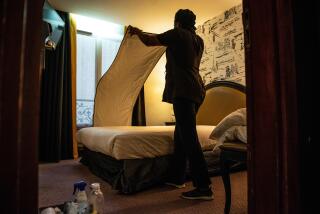SOUTHERN CALIFORNIA JOB MARKET : WEATHERING THE WORKPLACE : CONFLICT OF INTEREST : A big issue is reconciling the need to work and the desire for a satisfying home life.
- Share via
For a few years back in the ‘60s, we had a maid. Eloise drove her black Oldsmobile to our house every day. She cleaned, looked after the kids when we came home from school and prepared dinner while our parents worked at their clothing store.
Once in a while, Eloise would bring her son to our house. He was my age, or a little younger. We played together, but we didn’t talk much. I’m not sure if I wondered, back then, who took care of Eloise’s son while she was taking care of us. It would have been--and is--a good question.
Like Eloise, generations of working women knew all too well the conflicts inherent in employment outside the home. Two awesome responsibilities tugged at these women: putting food on the table and being home to serve it.
Little would Eloise have expected that this most basic dilemma of her life would, over the next 20 years, be recognized as the most critical social issue on the nation’s economic agenda.
Child care. Parental leave. Comparable worth. Glass ceilings. And, yes, the “mommy track.” These are the words our legislators and policy makers use when they talk about the consequences of the fact that so many Americans today, men and women alike, are just like Eloise was in 1965. We have to work. We want to work. And we want to be fully engaged in our children’s lives.
Who would imagine that the Harvard Business Review could beat Oprah and Donahue to identifying a pertinent national phenomenon? That’s just what was accomplished by Felice N. Schwartz’s article on the corporation’s response to women who take time out to raise families.
By proposing that “mommy track” careers win acceptance as a respectable role in the company--allowing women to trade their aspirations to top management for the freedom to check into and out of the work force--Schwartz touched off a resonant national debate on how we can satisfy our twin commitments to work and home.
This is one of those issues that demographics forced onto the table. Steadily over the past 30 years, more highly skilled women have poured into the labor market. Today, a solid majority of women with small children are working. Add in the forecast that women, along with minorities and immigrants, will make up 85% of the new entrants to the work force in the 1990s, and it becomes apparent that women’s concerns cannot help but become industry’s.
But it is not only women who are torn by the demands of job and family. Part of the furor raised by the “mommy track” thesis was its failure to take into account the growing number of daddies who define “having it all” as both advancing at work and being full-time fathers.
The conundrum gets a thorough exploration in the articles in this section. As does a range of the problems that add to the stress of working life, from sick buildings to badly designed chairs to the endless commutes that burn up so much of the time that Southern Californians would rather spend with their kids or their jobs.
Eloise quit housekeeping to become a truck driver. She was away from home for long periods. But she stayed home for long periods, too.
Others try to juggle their responsibilities by working at home or working for themselves or working a night shift, so at least one parent is around when the school bus drops off the children. In Los Angeles, we devise stratagems to use more efficiently the time we spend working in a sprawling metropolis. And we fight back when our work seems to be making us sick; we’re little good to our families if we’re used up by the job.
Many, of course, just remain frustrated.
The salve, as new parents discover and experienced parents know, is to pause during the workday and look at those pictures of the kids that you’ve placed on your desk or in your locker or in the cab of your truck. They may remind you why you go to work. And they’ll surely make you feel better until you get home.
More to Read
Inside the business of entertainment
The Wide Shot brings you news, analysis and insights on everything from streaming wars to production — and what it all means for the future.
You may occasionally receive promotional content from the Los Angeles Times.










